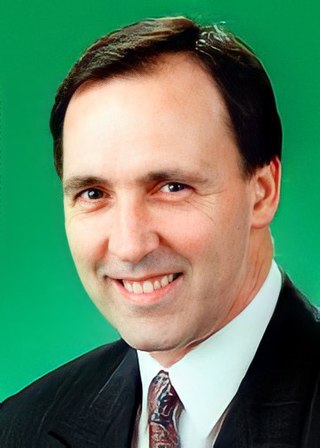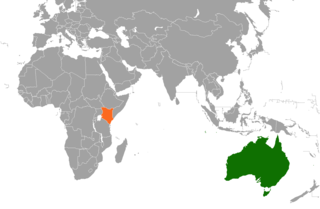Related Research Articles

Robert James Lee Hawke was an Australian politician and trade unionist who served as the 23rd prime minister of Australia from 1983 to 1991. He held office as the leader of the Australian Labor Party (ALP), having previously served as the president of the Australian Council of Trade Unions from 1969 to 1980 and president of the Labor Party national executive from 1973 to 1978.

Paul John Keating is an Australian former politician who served as the 24th prime minister of Australia from 1991 to 1996, holding office as the leader of the Australian Labor Party (ALP). He previously served as the treasurer of Australia in the Hawke government from 1983 to 1991 and as the seventh deputy prime minister of Australia from 1990 to 1991.

Ian McCahon Sinclair is an Australian former politician who served as leader of the National Party from 1984 to 1989. He served as either a minister or opposition frontbencher for all but a few months from 1965 to 1989, and later Speaker of the House of Representatives from March to August 1998.

Peter McCallum Dowding SC is an Australian lawyer and former politician who was the 24th Premier of Western Australia from 25 February 1988 until his resignation on 12 February 1990. He was a member of parliament from 1980 to 1990.
Brian Thomas Burke is an Australian former politician who was the 23rd premier of Western Australia from 25 February 1983 to his resignation on 25 February 1988. He was a member of the Western Australian Legislative Assembly from 30 March 1973 to 25 February 1988, representing the electoral districts of Balga and Balcatta at various points, and was the leader of the Australian Labor Party in Western Australia from 18 September 1981 to 25 February 1988. Burke studied law at the University of Western Australia for one year before dropping out. During the 1960s and early 1970s, he worked as a journalist for The West Australian newspaper, 6PM radio station, and Seven News Perth. He was elected to Parliament at the 1973 Balcatta state by-election, becoming one of the most popular local members over the following years. In 1981, he became the leader of the Labor Party in a leadership spill. He led the Labor Party to its first election victory since 1971 at the 1983 Western Australian state election, defeating the Liberal-National government of Ray O'Connor.

John Norman Button was an Australian politician, who served as a senior minister in the Hawke and Keating Labor governments. He was notable for the Button car plan, which involved downsizing and eventually ending Australia's car industry by reducing tariffs and government protection.
The Prices and Incomes Accord was a series of agreements between the Australian Labor Party (ALP) and the Australian Council of Trade Unions (ACTU), in effect from 1983 to 1996. Central to these agreements was an incomes policy to address the stagflation crisis by restraining wages. The unions agreed to restrict their wage demands, and in exchange, the government provided a 'social wage' of welfare and tax cuts.

The Hawke–Keating government is an all-encompassing term to describe the duration of the Hawke government and the Keating government, which together spanned from 11 March 1983 to 11 March 1996. Both governments were formed by the Australian Labor Party, and were led from 1983 to 1991 by Bob Hawke as Prime Minister, and from 1991 to 1996 by Paul Keating as Prime Minister, with Keating serving as Treasurer throughout the Hawke government. During the Hawke–Keating government, the Labor Party won five successive federal elections, its most electorally successful period to date; the 13-year uninterrupted period of government also remains the Labor Party's longest spell in power at the federal level.

The Hawke government was the federal executive government of Australia led by Prime Minister Bob Hawke of the Australian Labor Party (ALP) from 1983 to 1991. The government followed the Liberal-National Coalition Fraser government and was succeeded by another Labor administration, the Keating government, led by Paul Keating after an internal party leadership challenge in 1991. Keating was Treasurer through much of Hawke's term as prime minister and the period is sometimes termed the Hawke-Keating government.

Bilateral relations exist between Australia and Kenya. Both Australia and Kenya were formerly part of the British Empire, although not simultaneously, and are current member states of the Commonwealth of Nations. As of 2020, both Commonwealth nations have maintained bilateral relations for 55 years.
William Allan McKinnon was a senior Australian public servant. He was Secretary of the Department of Immigration and Ethnic Affairs between 1983 and 1987.
Australian governments, both those of the colonies after the introduction of responsible government in the 1850s and the national government since federation in 1901, have had the power to fix and change tariff rates. This power resides in the respective legislatures, with tariffs, being a tax law, is required to originate in the lower house of the legislature.
The Teachers' Credit Society (TCS) was a credit union founded in 1971 best known for its part in the WA Inc scandal of 1987. Over the 16 years it operated, the TCS grew from a 300-member society into the largest credit union in Australia, with 40,000 members and A$550 million on deposit and millions out on loans. The TCS was considered one of the major driving forces behind the 1980s "debt-funded boom" in Western Australia (WA) and its collapse, along with the collapse of several other large corporations within WA such as Qintex, Bond Corporation and The Bell Group, triggered an economic recession in the state.
The Australian Space Office (ASO) was an agency formed by the Hawke government in 1987 to oversee the National Space Program. The office worked on the initiative along with the Australian Space Board, later the Australian Space Council. As part of the larger National Space Program, the ASO was established specifically to act as the secretariat and day-to-day manager of the advisory decisions made by the ASB/ASC. The office was abolished in 1996 by the Howard government after a review by the Bureau of Industry Economics.
The Australian Space Board was a board that made up part of the Australian National Space Program initiative from 1986 until it was superseded by the Australian Space Council in 1994.

The National Space Program was a set of policies and organisations under the Hawke and Keating governments created with the goals of developing a national space industry in Australia. When the Howard government came to power in 1996 the program was abolished following the advice of the Bureau of Industry Economics. The National Space Program was generally considered a failure by most media after its demise. During its existence it was crippled by a lack of budget, and multiple white elephant projects.

The Bureau of Industry Economics (1978-1998) was an Australian government body dedicated to advising the government on industry matters, particularly pertaining to investment. In 1998 with the passing of the Productivity Commission Act 1998 the bureau was merged with the Industry Commission, and the Economic Planning Advisory Commission to create the Productivity Commission.
Auspace Pty Ltd was an Australian aerospace company formed on 7 June 1982 as a joint-venture between Hawker de Havilland Australia and SA Matra Espace. It was primarily known for its work as a major contractor for the Keating National Space Program that took place between 1986 and 1996.
Frederick James McCauley (1905-1995) was an Australian trade unionist from the Canberra and Queanbeyan region.
Glenn Alexander Withers is an Australian economist, policy adviser, and academic. He is an Honorary Distinguished Professor of Economics at the Australian National University and Visiting Professorial Fellow at University of New South Wales Canberra.
References
- 1 2 "PM shakes up EPAC". Canberra Times (ACT : 1926 - 1995). 17 August 1994. p. 1. Retrieved 10 August 2019.
- ↑ Economic Planning Advisory Commission Act 1983. 1983.
- ↑ "NATIONAL ECONOMIC SUMMIT CONFERENCE Plan to co-ordinate $10,000m in works". Canberra Times (ACT : 1926 - 1995). 15 April 1983. p. 10. Retrieved 10 August 2019.
- ↑ Commission, corporateName:Productivity. "A brief history". www.pc.gov.au. Retrieved 9 August 2019.
- ↑ "NEWS & NOTICES". Tharunka (Kensington, NSW : 1953 - 2010). 18 September 1984. p. 3. Retrieved 10 August 2019.
- 1 2 "Opposition wants 'trade emergency'". Canberra Times (ACT : 1926 - 1995). 22 April 1986. p. 9. Retrieved 10 August 2019.
- ↑ "'Us and them' philosophy". Canberra Times (ACT : 1926 - 1995). 21 April 1986. p. 2. Retrieved 10 August 2019.